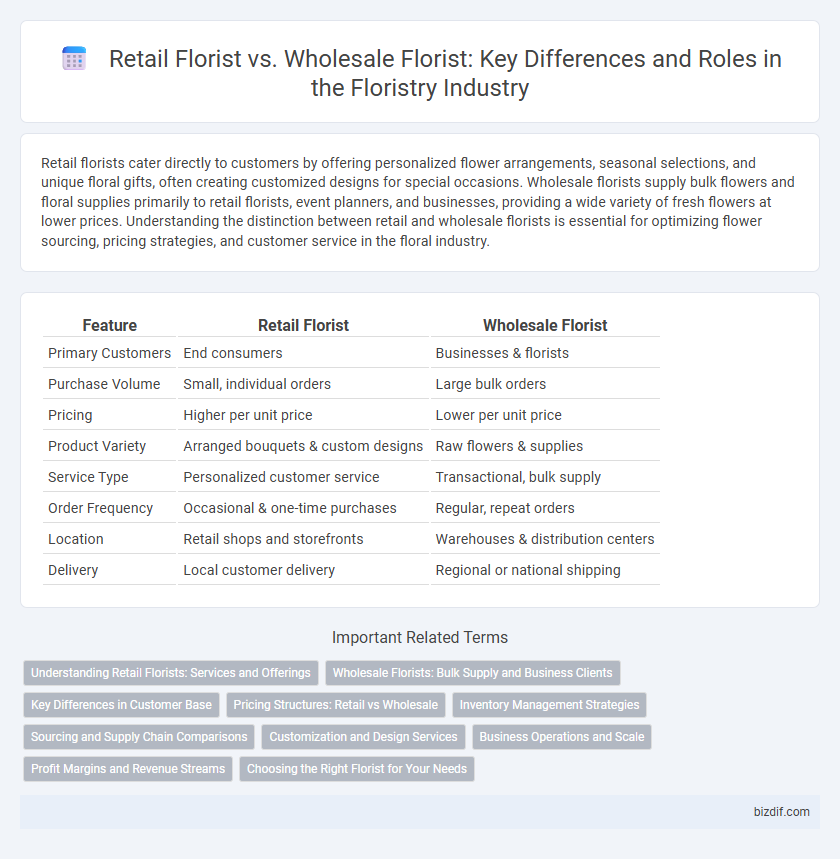Retail florists cater directly to customers by offering personalized flower arrangements, seasonal selections, and unique floral gifts, often creating customized designs for special occasions. Wholesale florists supply bulk flowers and floral supplies primarily to retail florists, event planners, and businesses, providing a wide variety of fresh flowers at lower prices. Understanding the distinction between retail and wholesale florists is essential for optimizing flower sourcing, pricing strategies, and customer service in the floral industry.
Table of Comparison
| Feature | Retail Florist | Wholesale Florist |
|---|---|---|
| Primary Customers | End consumers | Businesses & florists |
| Purchase Volume | Small, individual orders | Large bulk orders |
| Pricing | Higher per unit price | Lower per unit price |
| Product Variety | Arranged bouquets & custom designs | Raw flowers & supplies |
| Service Type | Personalized customer service | Transactional, bulk supply |
| Order Frequency | Occasional & one-time purchases | Regular, repeat orders |
| Location | Retail shops and storefronts | Warehouses & distribution centers |
| Delivery | Local customer delivery | Regional or national shipping |
Understanding Retail Florists: Services and Offerings
Retail florists cater directly to consumers, offering personalized flower arrangements, event decorations, and seasonal bouquets tailored to individual preferences. They provide a variety of floral services including custom design, delivery, and consultation for occasions such as weddings, funerals, and special events. Retail florists typically source flowers from wholesale suppliers but add value through creative design, customer service, and convenience.
Wholesale Florists: Bulk Supply and Business Clients
Wholesale florists specialize in bulk supply of flowers and floral materials, catering primarily to business clients such as retail florists, event planners, and garden centers. They offer a wide range of fresh-cut flowers, foliage, and floral accessories at competitive prices, enabling businesses to maintain diverse inventory and meet high demand. By providing large quantities with consistent quality and timely delivery, wholesale florists play a crucial role in the floral supply chain for commercial customers.
Key Differences in Customer Base
Retail florists primarily serve individual consumers seeking floral arrangements for personal occasions such as weddings, birthdays, and funerals, emphasizing custom designs and personalized service. Wholesale florists cater to business clients including event planners, other florists, and large institutions, supplying bulk flowers at lower prices for resale or large-scale use. The customer base distinction directly influences pricing strategies, order volumes, and product variety in each floristry sector.
Pricing Structures: Retail vs Wholesale
Retail florists typically charge higher prices per stem due to personalized service, custom arrangements, and overhead costs like storefront rent. Wholesale florists offer significantly lower prices by selling flowers in bulk with minimal packaging, targeting businesses and professional florists. The price difference reflects the volume, customization, and direct access to growers versus end-consumer convenience.
Inventory Management Strategies
Retail florists focus on maintaining a diverse inventory of high-demand flowers and seasonal arrangements, often using just-in-time inventory methods to reduce waste and ensure freshness. Wholesale florists manage large quantities of bulk flowers, employing advanced inventory tracking systems and cold storage solutions to extend shelf life and optimize supply chain efficiency. Implementing accurate demand forecasting and supplier coordination is crucial for both to balance stock levels and minimize spoilage.
Sourcing and Supply Chain Comparisons
Retail florists typically source flowers in smaller quantities directly from local farms, wholesalers, or specialized growers to ensure fresh inventory tailored to customer demand. Wholesale florists operate on a larger scale, purchasing bulk flowers from growers or international importers through extensive supply chains designed for rapid distribution to various retail outlets. The supply chain for wholesale florists involves sophisticated logistics, including cold storage and air freight, to maintain flower quality and meet high-volume orders efficiently.
Customization and Design Services
Retail florists specialize in personalized floral arrangements tailored to individual customer preferences, offering bespoke design services that include consultations and custom bouquet creations. Wholesale florists primarily supply bulk flowers and standard arrangements to businesses, focusing less on customization and more on volume and variety. Clients seeking unique, personalized floral designs benefit most from retail florists due to their hands-on approach and creative expertise.
Business Operations and Scale
Retail florists operate smaller-scale businesses focused on personalized customer service, offering a variety of fresh floral arrangements directly to consumers, often through storefronts or online platforms. Wholesale florists manage large-scale operations, supplying bulk quantities of flowers and floral supplies to retailers, event planners, and other businesses, emphasizing inventory management and logistics. The scale of wholesale florists demands efficient supply chain coordination and lower pricing structures compared to the more client-centric, higher-margin transactions typical of retail florists.
Profit Margins and Revenue Streams
Retail florists typically achieve higher profit margins per arrangement by charging premium prices for customized floral designs and personalized services, while wholesale florists rely on volume sales to generate revenue. Wholesale florists primarily supply bulk flowers to retailers, event planners, and businesses at lower unit costs, benefiting from economies of scale but experiencing thinner margins. Revenue streams for retail florists include direct consumer sales, event-related services, and floral subscriptions, whereas wholesale florists focus on large order contracts and consistent bulk deliveries.
Choosing the Right Florist for Your Needs
Retail florists cater directly to consumers with custom floral arrangements and personalized services, often providing unique, seasonal blooms ideal for personal events and gifts. Wholesale florists supply bulk flowers to retail florists, event planners, and businesses, offering competitive pricing and large quantities suitable for extensive floral projects. Selecting the right florist depends on whether you need individual, bespoke arrangements or bulk floral supplies for larger-scale needs.
Retail Florist vs Wholesale Florist Infographic

 bizdif.com
bizdif.com